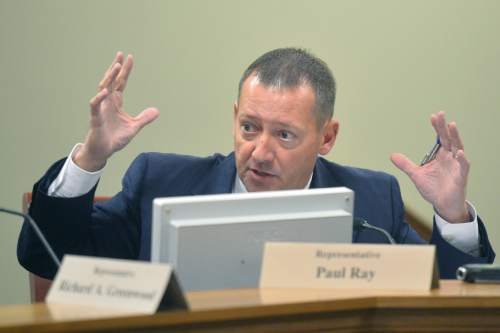This is an archived article that was published on sltrib.com in 2016, and information in the article may be outdated. It is provided only for personal research purposes and may not be reprinted.
Human traffickers could be sentenced to death if victims are killed in commission of the crime under a bill advanced Tuesday by a House committee.
"I think we all know how heinous of a crime human trafficking is. We have kids that are being trafficked for sexual purposes, for labor," said Rep. Paul Ray, R-Clearfield, the sponsor of HB136. "We just think it's a good move to make this available to the prosecutors to have in their arsenal if they need to go at it."
Ray's legislation makes engaging in human trafficking an aggravating factor that makes a homicide eligible for capital punishment.
In the past, Ray sponsored legislation making deaths resulting from child abuse eligible for the death penalty and he argued Tuesday that they type of abuse victims of trafficking suffer should warrant the same kind of punishment.
"This is the most heinous of crimes," said Bountiful Police Chief Tom Ross, who is president of the Utah Chiefs of Police Association. "This is the death of a child who has been tortured through abuse or sexual assault."
The House Law Enforcement and Criminal Justice Committee voted 6-3 to move the legislation to the full House for a vote, which could come by the end of the week.
Ray had originally envisioned the bill to just apply to child trafficking, but expanded it Tuesday to include adults, as well. It would be up to prosecutors to decide whether to seek capital punishment.
Opponents argued the death penalty is arbitrary in its application, costly to the state and that the resources would be better spent helping victims of human traffickers.
"Don't consider spending this kind of money on this kind of an action that really only ends up over-criminalizing conduct that is already criminal when you're leaving your victims without support and without resources," said Virginia Ward, who works with victims of trafficking.
The Utah chapter of the American Civil Liberties Union said in a statement to the committee that race, socio-economic background, effectiveness of attorneys and other factors determine whether capital punishment is imposed and Ray's bill "keeps moving Utah in the wrong direction."
"We ought to be using this money wisely and the death penalty is not a wise use of resources," said Kent Hart, executive director of the Utah Association of Criminal Defense Lawyers. "It also engages the citizens of this state and this body in killing of its citizens. … We cannot sanitize it any way."
It is estimated that a death-penalty case costs taxpayers about $1.6 million to work through the court system and carry out the execution, an expense paid for by the county seeking the death penalty.
Rep. Brad Daw, R-Orem, said it is "absolutely appropriate" that human trafficking be added to the list of crimes in which the death penalty is an option.
"If we get right down to the morality of it … and the reason they're being prosecuted for the death penalty, for me it really does not become a very challenging issue," he said. "The fact is they've done things that are horrific. They're heinous. … This bill makes perfect sense to me."
Twitter: @RobertGehrke



